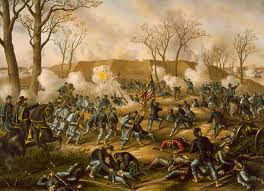
The Civil War was the first modern war. Men and supplies moved by railroad, orders moved by telegraph and war itself moved from the battlefield to the cornfield. The Civil War was not only the first modern war, it was one of the first “total wars”. This kind of war called for total surrender. There was to be no compromise when it came to surrender. This model of “unconditional surrender” became central to warfare for the next century. One of the first instances in which the term “unconditional surrender” was used was the Battle of Fort Donelson, Tennessee, in 1862. Ulysses S. Grant used the term when he demanded “No terms but unconditional and immediate surrender” of the Confederate garrison at Fort Donelson.
Grant had first moved down the Tennessee River to Fort Henry, Tennessee. His army troops were accompanied by a gunboat fleet under Andrew Foote. Foote was a man of temperance and refrained from strong drink. On the other hand, Grant was accused of being a flat-out drunk. Despite their differences, Foote and Grant worked well together and they took Fort Henry in early February, 1862. Grant and Foote than took their forces down the Cumberland River towards Fort Donelson.
The Confederate fort was defended by men under three generals. John Floyd and Gideon Pillow escaped from the fort before its surrender. Simon Bolivar Buckner was the surrendering general. The battle for the strategic fort began on February 11. The fort was important because, like Fort Henry, it guarded an important river into the Confederacy: the Cumberland.
Foote attempted to bombard the fort into submission on the 14th. However, Fort Donelson had much superior firepower than the easily-bombarded Fort Henry. Foote’s gunboats were forced to withdraw. John Floyd decided to lead a sortie from the fort, with the goal of cutting a path of escape through the besieging Union lines. Grant arrived from his headquarters to lead a counterattack. Floyd withdrew into the fort. The next day, Floyd and Gideon Pillow escaped from the fort, leaving it in the hands of Simon Bolivar Buckner, an old friend of Grant. Buckner had even paid Grant’s way home to Illinois after he was dismissed from service in California for alleged drunkenness in 1854. Buckner hoped that Grant would repay the favor by agreeing to lenient surrender terms. Grant refused. One of Grant’s officers advised Grant to accept only “unconditional surrender”. Grant took his advice and declared to the unfortunate Buckner that he would accept “No terms but unconditional and immediate surrender”.
Buckner surrendered and Grant earned a new nickname. U.S. Grant became “Unconditional Surrender” to his men. Grant would lead more fighting in the South throughout the war. He would barely manage a victory at Shiloh. After what many Northerners saw as Grant’s drunken incompetence at Shiloh they demanded his dismissal. Abraham Lincoln refused, saying, “I can’t spare this man, he fights”.
